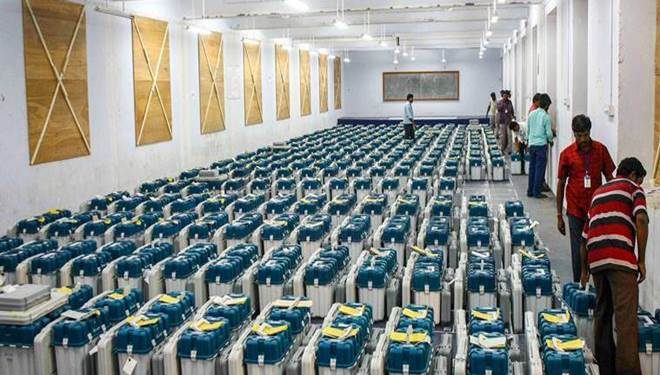New Delhi: Tight security arrangements have been put in place at various centres across the national capital where the counting of votes polled in the high-stakes February 8 Delhi Assembly elections will take place Tuesday.
The curiosity among people to know the outcome of the elections to the 70-member Delhi Assembly has heightened post-exit polls, that has forecast a big win for the ruling Aam Aadmi Party (AAP), and the delay in announcement of the final voter turnout by authorities.
The election, largely seen as a battle between the ruling AAP and the BJP, which went aggressive during the high-octane campaign, was held Saturday, sealing the fate of 672 candidates – 593 men and 79 women.
Nearly 24 hours after the polling ended, the Election Commission (EC) announced Sunday that the final voter turnout was 62.59 per cent, five per cent less than 2015, and asserted that it followed the laid down process to compile data, after the AAP questioned the ‘delay’.
Authorities in the Delhi CEO Office are gearing up for the counting of votes and adequate arrangements have been made at the centres spread across 21 location in the national capital, spanning 11 districts, officials said.
The counting centres are located at CWG Sports Complex in East Delhi, NSIT Dwarka in West Delhi, Meerabai Institute of Technology and GB Pant Institute of Technology in Southeast Delhi, Sir CV Raman ITI, Dheerpur in Central Delhi, and Rajiv Gandhi Stadium in Bawana in North Delhi, among other places. There will be 33 counting observers, EC officials said.
There were 13,780 polling booths where every vote was accounted for by the presiding officers which is a time-consuming exercise, Sandeep Saxena, Senior Deputy Election Commissioner, said at a press conference on Sunday.
Security personnel have been guarding the strong rooms storing electronic voting machines (EVMs).
Delhi Chief Electoral Officer Ranbir Singh, a day ahead of the polls, had said all EVMs have been tested and they are ‘foolproof and non-tamperable’.
Exit polls on Saturday predicted an easy win for the AAP, which sought to retain power on development plank, against the BJP that ran an aggressive campaign centred around the issues of anti-CAA protests and nationalism.
Most exit polls also predicted that Congress is unlikely to open its account even this time in Delhi, which it ruled from 1998-2013.
Looking to capture power after 22 years, the BJP had mounted one of the most aggressive campaigns in the Delhi Assembly polls, with Union Home Minister Amit Shah leading the saffron charge on its planks of Hindutva and nationalism, and its strident opposition to Shaheen Bagh protests.
Over 1.47 crore people were eligible to vote in the Delhi polls, including 2,32,815 in the age group of 18-19.
Voters in various categories included males (81,05,236), females (66,80,277), service voters (11,608), third gender voters (869), and senior citizens (aged 80 and above) voters (2,04,830), officials said.
PTI






































